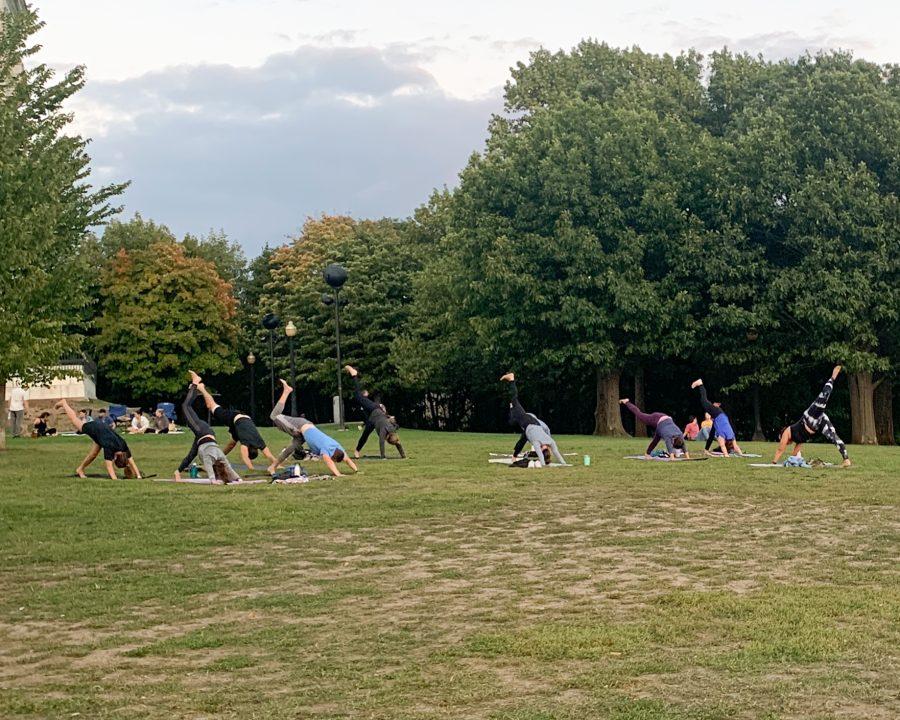As the semester begins and we are thrust back into classes, activities and other responsibilities, it is easy for students’ stress levels to rise. We are once again saddled with nightly reading, long papers, labs and other assignments, and it is easy to become overwhelmed. In addition to the already stressful nature of student life, we are amid a global pandemic, which undoubtedly has caused stress for every one of us in one way or another.
The good news is that though this stress piles up as the semester continues, there are many things we can do to combat it. One particular strategy to aid in the reduction of stress is the practice of meditation—more specifically, mindfulness meditation.
In popular culture, meditation is often thought of as something that one does sitting cross-legged, reaching their arms outwards and keeping their palms up, humming “om” at a low pitch. In reality, this is not what meditation has to be at all! Meditation can be practiced almost anywhere or anytime for any amount of time, as long as you’re open and willing.
In order to practice mindfulness meditation, first, go somewhere where you feel comfortable. Your environment does not need to be completely silent, but it should be somewhere where you will not be disturbed. Once you find a good spot to meditate, you can stand, sit, or lie down in a comfortable position. Close your eyes, or fix your gaze on a single spot on the floor. Set a timer for anywhere between two and ten minutes.
Next is the most important part. For the duration of your meditation session, focus on the present moment. Breathe in and out slowly and focus on how your breath feels in your body. Concentrate on how your stomach expands when you inhale and contracts when you exhale. Focus on if you feel your breath flowing through your nose or your mouth. Notice any sounds, smells, or sensations that may surround you without thinking about them; stay focused on your breath, and how your body feels in whatever position you are in.
Your mind is bound to wander, and it probably will very quickly into your meditation session if you’re new to the practice. It is important to notice that your mind has wandered away from the present moment and has begun thinking about something else. Likely, your thoughts have wandered towards that test you have, all of the work you have to get done, or something else that is stressing you out. Notice that stress and then accept it. Accept that your mind has wandered from concentrating solely on the present moment, and accept that fact too. Do not be hard on yourself for thinking—that is only natural for us as humans to do. Instead, just take a deep breath and refocus. Repeat that process of noticing that your mind has wandered, accepting that fact without judgment, and refocusing on the present moment.
There are many apps available for aiding in meditation or giving a guided meditation as well, such as Headspace, Breathe, and Simple Habit. My personal favorite is Sanvello, because it has a feature where you can pick a relaxing sound such as “ocean waves,” or “rooftop rain,” set a timer, and then when your timer has run out, you are brought out of your meditation with a gentle chime.
Meditation, though not easy, is a low-cost method of relaxation that can provide short-term benefits at the moment, and long-term benefits if practiced regularly. Researchers from Johns Hopkins University in Baltimore published findings that suggest that mindful meditation “can help ease psychological stresses like anxiety, depression, and pain” (2). Mindful.org states that meditation can help you understand your pain, lower your stress, connect better, improve your focus, and reduce brain chatter. Mayoclinic.org cites “building skills to manage stress,” “gaining a new perspective on stressful situations,” and “increasing self-awareness” as just some of the benefits that practicing meditation offers.
Though meditation is certainly not a cure-all for stress or mental health issues, setting aside some time each day to breathe and sit in the present may prove beneficial, and at the very least, may come as a welcome reprieve from the hectic world outside.
https://www.mayoclinic.org/tests-procedures/meditation/in-depth/meditation/art-20045858
https://www.healthline.com/health/mental-health/top-meditation-iphone-android-apps#headspace





















































